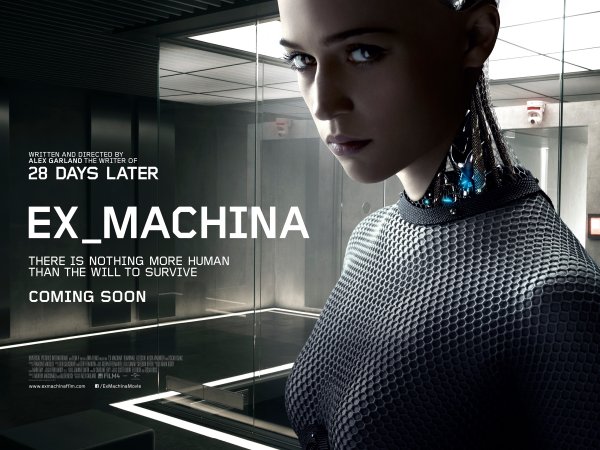
As usual, spoiler alert! If you intend to watch it, watch if before reading here.
Wikipedia offers this brief. “Caleb is a programmer working for Bluebook, the world's most popular search engine. He is chosen to visit the company's eccentric CEO, Nathan, at his secluded research facility in the mountains. The only other person there is Kyoko, a young housemaid. Nathan reveals he has been working on artificial intelligence and wants Caleb to administer the Turing test to an artificial intelligence (AI) named Ava. The Turing test is designed to test a computer's ability to persuade the tester it is human.” You can read more here, or on IMDB, or watch the film.
Most of the film is set inside Nathan's house, which is also his personal and private R&D facility. It's very remote, isolated and secure, and this facility is played as the independent space-time zone. The facility's security system can be breached.
Obviously, Bluebook as the world's most popular search engine connects it with Google. The name further identifies it with Facebook. Reference is also made to Twitter as the ubiquitous BLUE bird social media.
The color in the name identifies IBM by their nickname, “Big Blue.” Big Blue is famous for their AI named Watson. An article about Watson's famous exploit from over 4 years ago reads, “In the end, the humans on “Jeopardy!” surrendered meekly. Facing certain defeat at the hands of a room-size I.B.M. computer on Wednesday evening, Ken Jennings, famous for winning 74 games in a row on the TV quiz show, acknowledged the obvious. “I, for one, welcome our new computer overlords,” he wrote on his video screen, borrowing a line from a “Simpsons” episode.” (NY Times: Computer Wins on ‘Jeopardy!’: Trivial, It’s Not)
If you watch Ex_Machina you'll perceive how nudity (and the fact that the android was modeled on his personal porn profile) makes it a Blue film or Blue picture, one that features adult content. The name, Bluebook, like the title of a porn magazine or novel, suggests that voyerism, perverse sexuality and exploitation is among the search engine company's core interests, and this is represented in the film.
An intended reference to Project Blue Beam also seems likely, especially since Caleb and Nathan are biblical names, and the starring android Ava plays strongly on one level as Eve, the first woman. “Project Blue Beam is a conspiracy theory that claims that NASA is attempting to implement a New Age religion with the Antichrist at its head and start a New World Order, via a technologically-simulated Second Coming.”
The title appears to be derived from the Latin expression, Deus Ex Machina.
“Deus Ex Machina is a calque from Greek (apò mekhanês theós), meaning "god from the machine". The term has evolved to mean a plot device whereby a seemingly unsolvable problem is suddenly and abruptly resolved by the contrived and unexpected intervention of some new event, character, ability or object. Depending on how it is done, it can be intended to move the story forward when the writer has "painted himself into a corner" and sees no other way out, to surprise the audience, to bring the tale to a happy ending, or as a comedic device.” (Wikipedia)
The employment of the namesake dramatic device appears as Caleb himself is manipulated by Ava to provide a surprise ending. The manipulation changes the outcome from what looks like it might have a kind of happy ending in a romantic way, to one that is chilling in picturing the cold betrayal of a machine without humanity.
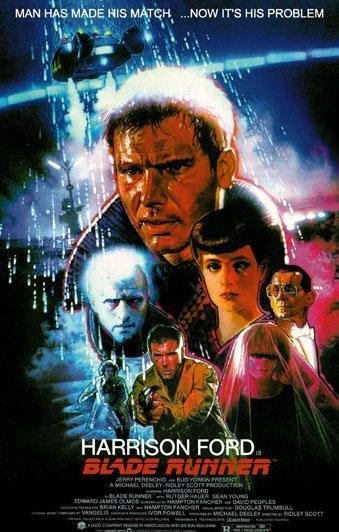 It's not Blade Runner, where Deckard gets away in the end with Rachel, the special replicant (AI android) he came to love.
It's not Blade Runner, where Deckard gets away in the end with Rachel, the special replicant (AI android) he came to love. Here's what the actual title tells us about the film, as an equation.
Ex_Machina = Deus Ex Machina - Deus
Deus equates to theós, God. Our attention is drawn to deity. They have removed “God” from the machine. From the machine, no god or not god. If we consider how Ava is a machine, it suggests that she is godless, manifesting ungodliness or a demonic nature. That is the profound impression we're left with as the final credits roll.
During one scene, the eccentric Nathan comically twists a comment made earlier by Caleb. “I am God,” he says, testing the statement and exhibiting what has been called a God-complex. He's in the role of the Creator, obviously. He's heartlessly murdered by his soulless creation toward the end. It's like, Pinocchio, with a twist. The puppet becomes a real boy, but in this twist up, he has to kill Gepetto first. The murder pictures the Devil's vision where he, the creature, destroys his Creator. That's what his version of the space-time ark is for, which we see manifesting in the face off of Revelation 19:19.
Elon Musk, businessman and tech genius (PayPal, Tesla Motors, SpaceX , Hyperloop, SolarCity), has gone on record warning about the dangers of AI. “Summoning the demon,” to quote him. That has to be in the back of your mind when the film has ended and the viewer reflects on what has just been witnessed. Even Stephen Hawking and Bill Gates are warning of the threat AI presents to the future of mankind. All agree. It's not a matter of IF but WHEN.
But that's all pretty obvious really, or at least it should be. For those of us who know the sovereign God's plan to intervene before AI dooms mankind there is another kind of urgency to the present.
Aaron and I made several noteworthy observations while watching Ex_Machina.
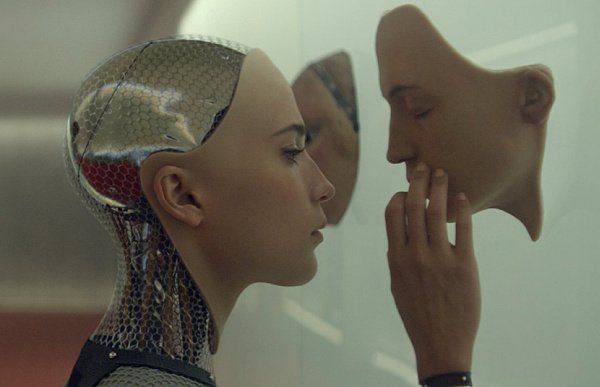
First, let's note that it plays heavily on the level of trauma based mind-control. Control is exerted over the androids as over Monarch slaves by their programmers. Those in the house are trapped inside secure compartments by forces out of their control. The many masks and skulls as severed heads represent dissociated alter identities, which are demonic. The many reflective surfaces and mirrors present us with mirror images of the characters as illustrations of how dissociated alters are created in mirrored pairings. The name, Kyoko, means, mirror. Waterfalls are Illuminati triggers for a memory wipe, prompting slaves to forget what has just happened. When Nathan is killed with the knife, he becomes a kind of blood sacrifice, a human sacrifice. Here, like in many other productions, the MK-ULTRA or Monarch programming symbolism is very woven in with an Antichrist layer. The army of chosen ones are secretly embedded in key positions and are activated as the time comes for their missions. They serve the antichrist agenda.
 Those who direct the programmers and the programming are behind all the control mechanisms of the world, driving AI, CERN, search engine and other control tech, global banking, government, the medical industry, organized religion, etc.
Those who direct the programmers and the programming are behind all the control mechanisms of the world, driving AI, CERN, search engine and other control tech, global banking, government, the medical industry, organized religion, etc. Beyond that, there's some social engineering with a gender dominance play. Nathan is the control freak and is overtly abusive toward Kyoko, his female maid. (Which we discover is actually an android - and his sex bot. Shades of The Stepford Wives.) That relationship dynamic is overturned in typical programmed Jezebel fashion when the women brutally dominate the men, destroying them. Ava, a female, emerges as the clear victor in the contest, having won through the exploitation of her feminine charms to manipulate a man.
There's a tense but hilarious scene where Nathan and Kyoko tear up the dance floor to the music of “Get Down Saturday Night.” The stunned look on Caleb's face is perhaps the best part.

The dance is choreographed so that Nathan and Kyoko match moves. Programmer and slave, in sync, like marionettes, which speaks to me about how trauma-based mind-control programmers may at the same time be slaves themselves, with their own handlers and programmers. The decorative panels behind the dancers are of a complex design, but as you see in this image, it artfully presents a grid of obfuscated XO MOB symbols, and that's the backdrop for their dance. I've written about what the dance represents in media like Sucker Punch and Jessie J's “Price Tag” music video, and its the same here.
The images of Ava with mirrors present her as a goddess, an identification that's given more play as she ultimately supplants the creator.
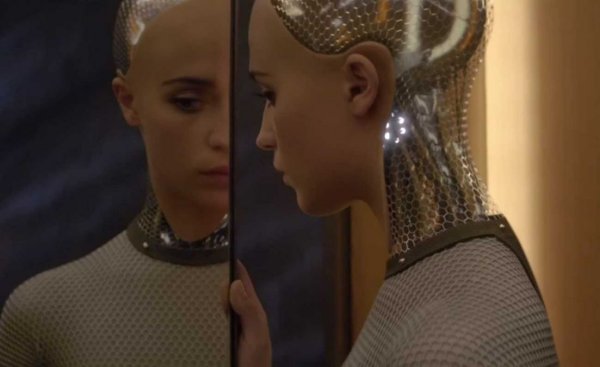
The name Ava plays off Eve and it also plays off the Latin, since the film's title is Latin. Think, Ave Maria. That's a song and a prayer identified with the goddess - the Hail Mary that Roman Catholics pray to “Holy Mary, Mother of God.” The way Ava is designed reminds me a nun wearing a habit, the way the face is framed. In one session, Caleb tells Ava a story and compares her to the character called Mary, Black and White. Again, the nun's habit. Mother Mary. Ava's face generally has a very innocent and pure look, like a nun or the Virgin Mary.
Some see AI as their hope of being saved from destruction. Some see the cessation of all effort toward AI as the only hope of the same. What the Hail Mary means in sports is a desperate attempt to score in the final moments where the odds of success are so slim that a miracle seems to be the only chance. Thus the reference to the prayer, Hail Mary, as calling upon the divine for that miracle.
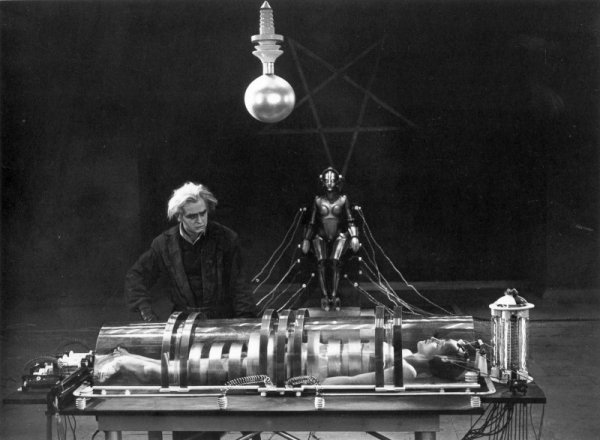
Connections to the art deco classic Metropolis are really evident because the artificial being was derived from the beloved Maria. Ave Maria - Ava - Maria with the helmet. Hitler and the some of the SS were obsessed with that film.
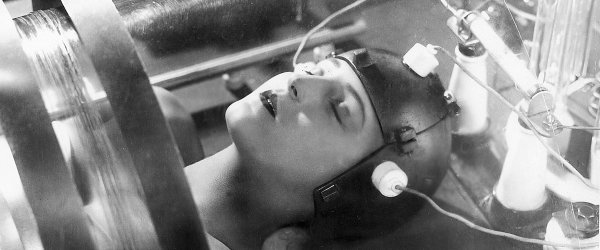
Given the mirrors and reflections of Ava, allusion to the looking glass as a dimensional portal, as in the children's mind-control classic, Alice Through the Looking Glass, can hardly be avoided. The story of Mary, Black and White certainly plays on that, and that story that involved
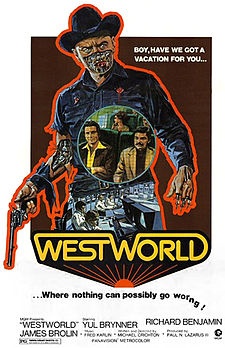 Mary's being introduced to color makes strong connections with another mind-control children's classic, the Wizard of Oz film, because the colorization dramatically went from black and white to color when Dorothy and Toto “went over the rainbow” to Oz.
Mary's being introduced to color makes strong connections with another mind-control children's classic, the Wizard of Oz film, because the colorization dramatically went from black and white to color when Dorothy and Toto “went over the rainbow” to Oz.Any listing of sci-fi films referenced by Ex_Machina really has to include the classic Westworld (1973), The Machine (2013) and of course, I, Robot (2004).
Nathan's house plays as the space time ark, so let's get to the time metaphors and references.
Straight away we have to address the casting of Domnhall Gleeson as the lead, Caleb. He played the endearing time traveler opposite Rachel McAdams in the film, About Time (2013). His character inherited the ability to travel back in time from his father, and regularly did so to change things more to his liking. Take a look at the promo image for the film. Why do you suppose the scene might be featured where they're getting wet in the pouring rain - in a film About Time travel? Water as time.

Domnhall plays the role of a synth (android) in a Netflix sci-fi episode of Black Mirror. It's called, Be Right Back (2013). I note that it's season 2 episode 1. That's episode 2:1. Twenty-one. The time number.
In Ex_Machina, when Caleb thinks he has won a competition at work, the prize is a mysterious trip to Nathan's house to spend time with the famous boss for a week, so off he goes. When the helicopter he has to take drops him off, it's in a remote wilderness setting with no buildings or roads anywhere in sight. The pilot gives him minimal direction. Follow the river, he offers, gesturing in the general direction. There's a clue. The river of time. What Caleb finds is like something right out of the future.
When Caleb finds the house, the first challenge is getting through security. At the secure gate that is disquised as an insubstantial wooden structure, he's provided with an instant picture id card. That gives him limited access to the facility that seems to have card readers and secured areas everywhere.

No one is there to greet him so he begins to explore, and he finds Nathan outside on the deck. It's a beautiful view, overlooking the river. Of time. The house is on one bank of the river, which is to say, anchored in time. As a picture of the world that is perhaps just a little further into the future, it's figuratively located on the other bank of the river.
 Nathan is working out. Specifically, he's punching a heavy bag. Are you thinking about The Avengers and Steve Rogers working out in the boxing gym? When I saw this, I sure was! The heavy-bag (probably an Everlast) is filled with sand, the sands of time. Here's a screenshot where we see the swinging sand bag superimposed over the river. Hello! Stacking the metaphors - just like in The Avengers with the water fountain and heating radiator!
Nathan is working out. Specifically, he's punching a heavy bag. Are you thinking about The Avengers and Steve Rogers working out in the boxing gym? When I saw this, I sure was! The heavy-bag (probably an Everlast) is filled with sand, the sands of time. Here's a screenshot where we see the swinging sand bag superimposed over the river. Hello! Stacking the metaphors - just like in The Avengers with the water fountain and heating radiator!In the comedic scene where Nathan and Kyoko get down with the Saturday Night disco dancing, Nathan's intro keeps the theme rolling. “I told you, you are wasting your time talking to her. You would not be wasting your time, however, if you were dancing with her.”
Near the end of Caleb's visit we see him standing in the kitchen. Nathan joins him and asks, “Do you know what day it is?” Caleb replies, “No.” Nathan grabs a kettle off the stove. “It's your last. Helicopter comes tomorrow morning 8 am.” Caleb: “Wow. Has it been a whole week?”
 Nathan stands at the sink and says, “Time flies.” He turns on the faucet and water flows into the kettle. “Man, but what a thing we've shared, huh? Something to tell the grandchildren, right?” This scene is “soaked” with time references, and the action is all about the water. Nathan actually says, “Time flies” (Tempus fugit, right?), demonstrating just that as he fills the kettle with water from the tap! From previous scenes, we know that, from where he's standing, Nathan has a spectacular view of the river flowing by the house. The mention of grandchildren gives the theme even more emphasis because that wouldn't happen until after much time has passed, since it appears that neither have any children.
Nathan stands at the sink and says, “Time flies.” He turns on the faucet and water flows into the kettle. “Man, but what a thing we've shared, huh? Something to tell the grandchildren, right?” This scene is “soaked” with time references, and the action is all about the water. Nathan actually says, “Time flies” (Tempus fugit, right?), demonstrating just that as he fills the kettle with water from the tap! From previous scenes, we know that, from where he's standing, Nathan has a spectacular view of the river flowing by the house. The mention of grandchildren gives the theme even more emphasis because that wouldn't happen until after much time has passed, since it appears that neither have any children.  Here's something that speaks so loudly to me. Given how the film's title is derived from an ancient theatrical device, the film's use of title screens really demands that we give them special attention because it's the employment of another theatrical device. It's uncommon now but long ago, in the silent film era, it was used extensively. The one in this screenshot pictures the last one in the series: “AVA: SESSION 7.” These sessions correspond roughly to the supposed Turing test and involve the interaction Caleb has with Ava.
Here's something that speaks so loudly to me. Given how the film's title is derived from an ancient theatrical device, the film's use of title screens really demands that we give them special attention because it's the employment of another theatrical device. It's uncommon now but long ago, in the silent film era, it was used extensively. The one in this screenshot pictures the last one in the series: “AVA: SESSION 7.” These sessions correspond roughly to the supposed Turing test and involve the interaction Caleb has with Ava. Here's what the Lord brought to my attention as I was looking at one of the title screens, and I believe this is probably the main reason for them. The name of the AI android is, Ava. Calculate the name (kind of like Revelation 13:17-18). A=1 and V=22, so AVA transforms to 1 22 1. She is a marvel of computer processing and her name computes to 1 22 1, like 12:21! If you're been following this blog closely (See The 12:21 Time Code) that should speak to you like it does to us. That's the numbering we've witnessed on the digital clocks in some key signal instances! When Aaron and I witnessed the 12:21 sign, there was always a colon involved because of the digital display. AVA: A V A colon. In the title sequence, the colon is shifted to the end, but there it is! AVA: ~ 12:21. This arrangement of the two time numbers 12 and 21 is pretty special, with the mirroring enhancing the potency of the signal. The secret to Ava in the film has to do with time.
(I note that there is a layering of sodomite sex magick in the titles' “AVA:”. The AV and/or VA is a very common signaling of the union of the sons of god with the daughters of men. The A and V are equivalent to the up and down pointing gender and space-time domain signaling triangles that are often overlaid one upon the other, as in the so-called Star of David. The colon is not just a punctuation mark, it's also anatomical. )
Our attention is drawn to something strange about Ava and time. When Caleb meets her and engages in the way of a Turing Test administrator, he poses the question, “How old are you?” She answers, “One.” “One what?” Caleb probes to see if she can identify a time unit with that number but she seems to display a lack of understanding. Knowing how the name, Ava, computes to 1 22 1 sheds light on what that exchange was really about.
It's important to make the link between Ava and time. She ultimately becomes the lord of time, in a sense, and that's how she gains ascendancy and wins her freedom. With the film's emphasis on cryptically signaling the theme of time, and with Ava's name decoding to a kind of reference standard of numbering for time, these provide critical insight into her role in the breaching of the security of the house. At the appointed time, according to the schedule arranged by her accomplice, she triggers the security system's rewritten protocol. Instead of locking down every door, all are opened. This illustrates how time is the key to defeat the security of the dimensional containment system. The time-lock of the prison and model space-time ark is unlocked in AVA: SESSION 7. 1221 and 7. Seven is, of course, the other time number that goes along with 12 and 21!
Here's another point of similarity connecting this film with The Avengers. In the scene where the Stark Tower was brought online, it was disconnected from the grid and switched over to being powered by the arc reactor. That made it the space-time ark tower, lighting up the sign. The switch-over was accentuated by the clever dialog playing on the AC to DC. (Part 2 - The Avengers - STARK Tower as Space-Time Ark - PP and AC to DC) Ava's ability to disconnect the house from the usual power supply was a factor in advancing the key aspects of the plot. Through her access to a battery recharging feature, she cuts off power and the back-up power system kicks in. First, that was how the surveillance system was defeated to allow her to communicate privately with Caleb. For brief periods, Nathan was unable to monitor their interaction. Ava managed her plan of escape by exploiting those opportunities to manipulate her accomplice. At the scheduled time, after Caleb had betrayed his host by stealing his identity (card) and rewriting the house security protocols, the disconnection and transition of house power allowed for Ava's escape. Security Breach! AC to DC. Nathan's secure facility as Stark Tower.
A programmer (reddit user Infintie_3ntropy) took the code that appeared on screen when Caleb was on Nathan's computer rewriting the house security protocols and executed it. It's written in a language called Python. (Yeah, Python) The version run was 2.7. It produced the following output.
ISBN = 9780199226559
The code references a book titled, “Embodiment and the inner life: Cognition and Consciousness in the Space of Possible Minds.” By Murray Shanahan. That's certainly a relevant subject, plus, I note that it introduces the word space. It was supposed to be the code rewriting the security protocols. The word Space - goes with the Time it was to be executed, 10 pm. Space-Time.
In another point of similarity with The Avengers, Ava's escape was like the scene where Captain Steve Rogers left the boxing gym with gym bag in hand and a sand bag over his shoulder. Before leaving the house, Ava clothed herself with synthetic skin and hair and clothes to make herself look just like a real person. I made a point in the last paragraph of Part 1 of The Avengers series that I'll repeat here. A garment is a metaphor for a body that is fit to access and operate within a specific domain. Different domains require different kinds of garments.
Here's a couple of examples from the biblical record, and two aptly numbered chapters.
6 On the very night when Herod was about to bring him forward, Peter was sleeping between two soldiers, bound with two chains, and guards in front of the door were watching over the prison. 7 And behold, an angel of the Lord suddenly appeared and a light shone in the cell; and he struck Peter’s side and woke him up, saying, “Get up quickly.” And his chains fell off his hands. 8 And the angel said to him, “Gird yourself and put on your sandals.” And he did so. And he *said to him, “Wrap your cloak around you and follow me.” 9 And he went out and continued to follow, and he did not know that what was being done by the angel was real, but thought he was seeing a vision. 10 When they had passed the first and second guard, they came to the iron gate that leads into the city, which opened for them by itself; and they went out and went along one street, and immediately the angel departed from him. ~ Acts 12:6-10
4 But when the day was now breaking, Jesus stood on the beach; yet the disciples did not know that it was Jesus. 5 So Jesus said to them, “Children, you do not have any fish, do you?” They answered Him, “No.” 6 And He said to them, “Cast the net on the right-hand side of the boat and you will find a catch.” So they cast, and then they were not able to haul it in because of the great number of fish. 7 Therefore that disciple whom Jesus loved said to Peter, “It is the Lord.” So when Simon Peter heard that it was the Lord, he put his outer garment on (for he was stripped for work), and threw himself into the sea. 8 But the other disciples came in the little boat, for they were not far from the land, but about one hundred yards away, dragging the net full of fish. ~ John 21:4-8
Ava's breaking out of her dimensional containment system models the beast's scheduled release from the abyss and also the scheduled release of those sentenced to be bound in the earth for 70 generations. Nathan's heavy-bag that he was punching during his workouts was a 70 pound bag of sand, one pound of sands of time for each generation of time. It was during the “AVA: Session 7” sequence that she broke out, on the last day of Caleb's scheduled week long visit. Because the 7th day of the week is Saturday, and the time Caleb programmed the security system that allowed Ava to gain control of the doors was 10 pm, I think the song that Nathan and Kyoko danced to was leading, predictive: “Get Down Saturday Night.”
The opening of all the doors in the seventh session echoes the taking of Jericho by Israel as they entered the promised land under Joshua's leadership. This insight is something I intend to explore further, Lord willing, but for this post I'm just going to introduce the comparison. In the famous record of Joshua 6, Israel marched around the walled city once each day for six days. On the seventh day, they marched around seven times, then blew their trumpets and shouted. Security Breach! The walls fall flat, as the Lord God had promised. The city was theirs. In Ex_Machina, the setup for the security breach came likewise during the first six sessions, and the breach was made in the seventh. Jericho was the entry point as Israel then advanced further to continue laying claim to their possession. So it is that Ava, having had all the doors opened, claimed the house as her domain, and proceeded from there to the crossroads of the world as the promised land.
Ex_Machina. Wow!
What the Lord has planned for His people is going to be beyond awesome. As clever as the Devil is, he won't see it coming when the tables are turned on him.

Excellent post!
ReplyDeleteThanks for the note of encouragement.
DeleteGreat article, very interesting. JADE Helm 15 is a test of the JADE AI system, which is a quantum computer that issues battlefield commands, so this is definitely a real threat they've been predictive programming into us for years, starting with Battlestar Galactica and then in the Terminator franchise, along with many others. ~Nathan
ReplyDeleteHere are a few videos, particularly one on JADE being an AI system: https://deusnexus.wordpress.com/2015/07/03/artificial-intelligence-controlling/
Great article! I've reposted part of it on Deus Nexus with a link to your site. You might also be interested in my analysis of "Avengers: Age of Ultron," Here: https://deusnexus.wordpress.com/2015/05/18/avengers-age-of-monarch/
ReplyDeleteThanks David.
Deletehttps://www.youtube.com/watch?v=WLWB_mIAe1M This video features a clock with 12 21 as well with a leather jacked hung underneath which in itself displays the number 6 of a female soccer player and on the back shows a 94. 9+4= 13. The leather jacket also shows "tiempo" (referring to a soccer boot probably of a certain brand) which is "time" or "weather" in Spanish. The color of the jacket is white and purple. The clock is shown at around min 5:56.
DeleteIn addition to that, the video shows the clock placed above a clothing rack a couple of more times. With a wide delta shaped black hanger hanging underneath (without the jacket then). Once the clock is shown in a sort of mirrored way and then in the normal way again with those two women. The soccer player who plays for England and a fashion designer who made this leather (skin of animals) jacket. The male soccer player has the number 10 represented as Roman numeral X, again having the 94 on the back of his jacket as well. Later the woman sits at a tea or coffee table with two cups and a small milk jug. A photographer uses the "flash light" several times which might also signal a certain sth as mentioned on your blog. In addition to the more modern camera they are also using some retro style instant photo camera.
DeleteThat female soccer player also seems to have meet up with some miss universe from the US in NYC (Silver Gate city as mentioned on this blog) recently. The latter shows herself in photos sitting on water hydrants in the city, drinking some frozen milk shake or ice cream with a straw or posing on poles next to a water hydrant pointing out her "ripped heart" on her jeans in the description to those photos.
DeleteNo that was miss USA.
DeleteThe above video seems to refer to the new coming soccer boot called "tiempo maestro" which fits with the "mastery of time" theme of number 13 ( 94 being a 9+4 =13 on the leather jacket as well as the letter M being number 13 counting from A. The seamstress says "leather is timeless", another reference to time. And the tea set on the table could refer to "tea time" and/ or A.i.W'land.
DeleteWhile reading this, I was reminded of the film, 'Howard the Duck', from the late 1980's.
ReplyDeleteA silly film, but it is very straightforward in Time-Space themes.
There is another layer of meaning in the dance scene with the song "Get Down Saturday Night." Saturday is named after Saturn, who was the god of time, so the dance can be seen as a celebration of Zeus' victory over Cronus in the ancient Greek accounting of "the time war."
ReplyDeleteThis video decodes the symbolism in the Back to the Future movie and how it is an elaborate display of the Zeus vs Cronus "time war."
https://www.youtube.com/watch?v=LjriZhDoyNQ
Before the dance scene begins, Caleb is talking to Kyoko whose name means mirror. Nathan enters the room and tells Caleb, once again, that he is wasting his time talking to her because she does not understand English. Nathan then tells Caleb that he would not be wasting his time, however, if he were dancing with her.
With Kyoko meaning mirror and Nathan's dialog establishing a time context we can view the dance itself as a time mirror. 12:21 is a time code and a time-mirror, as it were. The dance itself was synchronized. Kyoko was the mirror and Nathan was dancing with her - a dance with the mirror of time.
https://www.youtube.com/watch?v=WLWB_mIAe1M This video features a clock with 12 21 as well with a leather jacked hung underneath which in itself displays the number 6 of a female soccer player and on the back shows a 94. 9+4= 13. The leather jacket also shows "tiempo" (referring to a soccer boot probably of a certain brand) which is "time" or "weather" in Spanish. The color of the jacket is white and purple.
ReplyDeleteAlso, that digital clock in the linked video above not only features the time " 12" "21" but also date features: "Wed" "17" "APR" which then supposedly isWednesday, 17 April.
ReplyDelete